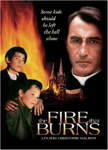

 |
The
Fire That Burns
|
 |
|
Ladymol's Review I think this must be one of those films that would be better to understand the original language (French) to appreciate fully; a great deal was lost in the translation. The film hinges on the nature of love and the philosophical discussions between the characters never really illuminated the passions at the centre of the story enough to make them believable. Two pupils in a Roman Catholic school have an intense friendship. The exact nature of this friendship is never really explained. There’s a kiss, which seems not to be their first, but other than that they just seem to like each other’s company. Without having this more explicit, the whole premise of the film falls rather flat. A priest who has an odd passion for the younger of the two boys manages to separate them by tricking the older boy and thus getting him expelled. Again, quite what this priest feels for the boy is not made clear (not in the subtitles, anyway). It genuinely doesn’t seem sexual, more the feelings of a parent who can’t separate themselves from their child—identifies too strongly with them. The film is gorgeous to watch. The two lead boys are amazingly cute and good actors. It held my attention, but more because I kept expecting something to happen (which didn’t) than for its actual content. Worth seeing, but more for cinematography and acting than story. Cerisaye's Review This is a beautiful and sensitive film about love between two boys, Sevrier, a quiet studious youth about 15/16, and Souplier, a bit of a rascal with behavioural problems, maybe 11/12. The story is set in the enclosed world of a strict Catholic school in Paris before the Second World War. There’s an innocence about their relationship though it’s clear this IS boy-to-boy love not comradeship as we see them kiss and hug, briefly but memorably. Sevrier has a powerful rival, the cunning and manipulative Abbé de Pradts, a handsome priest who acts as though his devotion to Souplier is paternal and nothing more. When at the end the Abbé is confronted about his relationship with the boy I was surprised to feel sorry for him. He finally opens up and shows emotion and passion for Souplier. It wasn’t just about power and control; he genuinely wanted to help the boy become the best he could be. And not out of misplaced wish to save him either. It made me think about the nature of love, sacred and profane, as shown in the story, and question whether Compared with the heavy-handedness of Sacred Silence this film is a gem. I particularly liked the way it shows the relationship between the boys, a proper adult treatment of a difficult and controversial subject that strangely reminded me of the joy of Chris Kent’s boys’ school stories (without the explicit sex). The film has amazing performances from the boys playing Sevrier & Souplier who depict very effectively the intensity of first-time experience. It cheats a bit on the subject of the Abbé’s love for Souplier. We’re led to believe, through subtle hints rather than anything explicit, he feels physical attraction, yet in the climactic scene, a dramatic (and prolonged) confrontation with the implacable head of school, he says HIS love is pure and unsullied, that he never allowed the boy to learn the nature of his attraction. What do we believe? Is he deceiving himself, lying to save his skin, or are we, like the Superior, making assumptions based on the reputation of priests for abusing young boys? Has the fire of passion within the Abbé consumed him so the love he professes has become something evil that threatens him and the innocent boy he adores? We’re left in the end to make up our own minds. The theme of sacrifice, of love so strong an individual will give up the object of adoration, is strong. I clutch to the sliver of hope that maybe the boys could triumph somehow over forces working to keep them apart. A hope that comes from their re-entry into a world beyond control of the church school ruled by a superior who believes only divine love worthwhile and untainted. A remarkable and complex film that deals intelligently with issues given prominence by recent proclamations from the Catholic Church about not allowing gay men to become priests. |